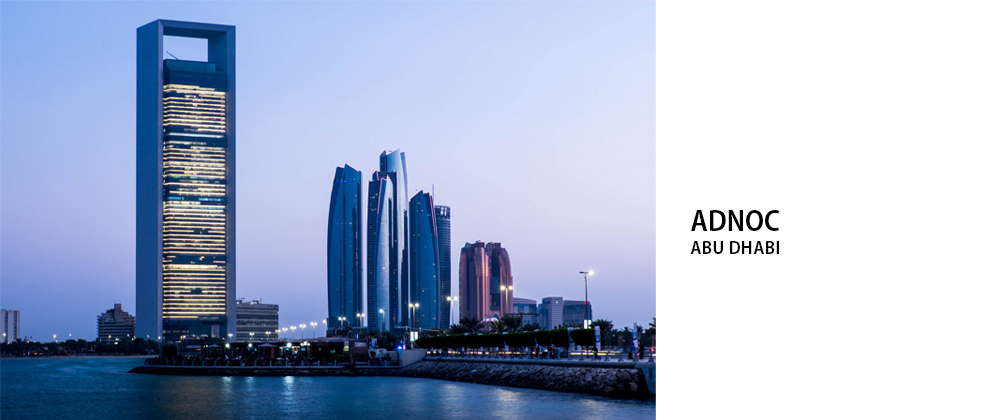
UAE state-owned oil company ADNOC
While the US seeks in vain to impose its will on the region through brute pressure and force, China is expanding its influence in the Middle East through oil and infrastructure deals. The latest deal with national oil company ADNOC provides an insight into how Beijing is increasing its presence in the offshore oil business.
Oilprice.com reports that China again figures prominently in another concession awarded in the Middle East, this time relating to the Abu Dhabi National Oil Company (ADNOC). In the aftermath of Saudi Arabia’s second disastrous oil price war, virtually all major Middle Eastern state-owned oil firms are looking to cover substantial operational deficits.
In the absence of a sudden major spike in oil prices, economic survival in practical terms now comes down to one of two broad options. The first is to sell off chunks of state assets in initial public offerings (IPOs) or stakes in ongoing oil and gas projects, which ADNOC recently did with the sale of a 49 per cent stake in its gas pipelines for just over US$10 billion to international investors. The second is to sell-off the same assets to companies from countries for which the immediate economic shortfall inherent in such deals pales into insignificance compared to the longer-term geopolitical and financial advantages. While the Western countries’ oil majors are preoccupied with their own financial and operational difficulties after an extremely troubled year, and Russia is preoccupied with consolidating the development of its own oil and gas fields, China is particularly well-placed to take advantage of the financial straits afflicting state-owned oil companies and governments in the Middle East.
In the latest example, ADNOC has announced the transfer of ownership rights in its Lower Zakum, and Umm Shaif and Nasr offshore concessions from the existing holding of the China National Petroleum Corporation (CNPC) to China National Offshore Oil Corporation’s (CNOOC) subsidiary, CNOOC Limited. This will be done by CNOOC acquiring a 40 per cent interest in CNPC’s majority-owned subsidiary PetroChina Investment Overseas (Middle East) Ltd (PetroChina) through its holding company, CNOOC Hong Kong Holding Limited (CNOOC HK).
After the proposal has been approved by Abu Dhabi’s Supreme Petroleum Council (SPC) – which is merely a formality – CNOOC will join the principal operating consortium in the Lower Zakum concession. The consortium is the epitome of business triumphing over geopolitics, as it also comprises ONGC Videsh (10 per cent stake) from China’s fierce rival India, as well as INPEX Corporation (10 per cent) from another fierce rival (Japan), along with China’s CNPC (6 per cent), Italy’s Eni (5 per cent), and France’s Total (5 per cent).
CNOOC will also join the principal operating consortium in the Umm Shaif and Nasr concession, comprising Total (20 per cent), Eni (10 per cent), and CNPC (6 percent). ADNOC will retain a 60 per cent majority ownership interest in both concessions.
Significantly, aside from the systematic expansion of China into the Middle East, in line with its multi-generational ‘One Belt, One Road’ programme, this deal marks the first time a dedicated Chinese offshore oil and gas company has joined in any ADNOC concession.
In this context, this latest deal follows the signing on 22 July 2019 of a comprehensive framework agreement between ADNOC and CNOOC to ‘explore new opportunities for collaboration’ in the upstream, midstream, and downstream oil sectors as well as in liquefied natural gas (LNG). Described at the time by ADNOC chief executive officer, Ahmed Al Jaber as “far-reaching”, the deal is such a significant move by China into the core oil and gas interests of one of the US’ few remaining vocal allies in the Middle East – the UAE – that the deal signing ceremony was attended in person by China’s President, Xi Jinping. Although couched in the usual platitudes expected in such deals, even the official guidance on its contents highlighted its vast scope and scale.
ADNOC and CNOOC, according to the official published notes on the agreement, will ‘share knowledge, best practices and technologies in ultra-sour gas development to improve operational efficiency in gas processing and treatment, deliver efficiency, performance and reliability for drilling operations and develop field and reservoir development plans’. As an adjunct to this, China’s Offshore Oil Engineering Company (COOEC) would be in prime position for associated engineering, procurement and construction opportunities, as would China Oilfield Services Ltd (COSL) for the supply of oilfield services and to explore collaboration opportunities in offshore oil and gas field assets in Abu Dhabi.
Also according to the July 2019 agreement, ADNOC and CNOOC will jointly explore LNG sales and purchase opportunities, share knowledge and expertise in LNG markets, and evaluate partnerships and joint investment opportunities in the LNG value chain. Finally, in the downstream sector, the two companies will collaborate in new integrated refining and petrochemical assets in China, co-operate in CNOOC’s refining assets, and jointly partner and invest in the refining and petrochemical value chain. The investment is just part of an overall push by China to invest US$45 billion in downstream activities in the UAE.
The frenetic world of business deals may have achieved another milestone while the fractious world of politics remains stuck in a morass of mutually destructive accusations, threats and posturing.
MORE ON THE TOPIC:




China is wisely strengthening its economy and creating alliances all over the world, while US implodes and garners global hatred for its destructive policies.
Price war, the tool of choice to goble competition (extensively used by the money masters (Rockerfehler, Amazon..), it only benefits China.. Let’s keep that in mind